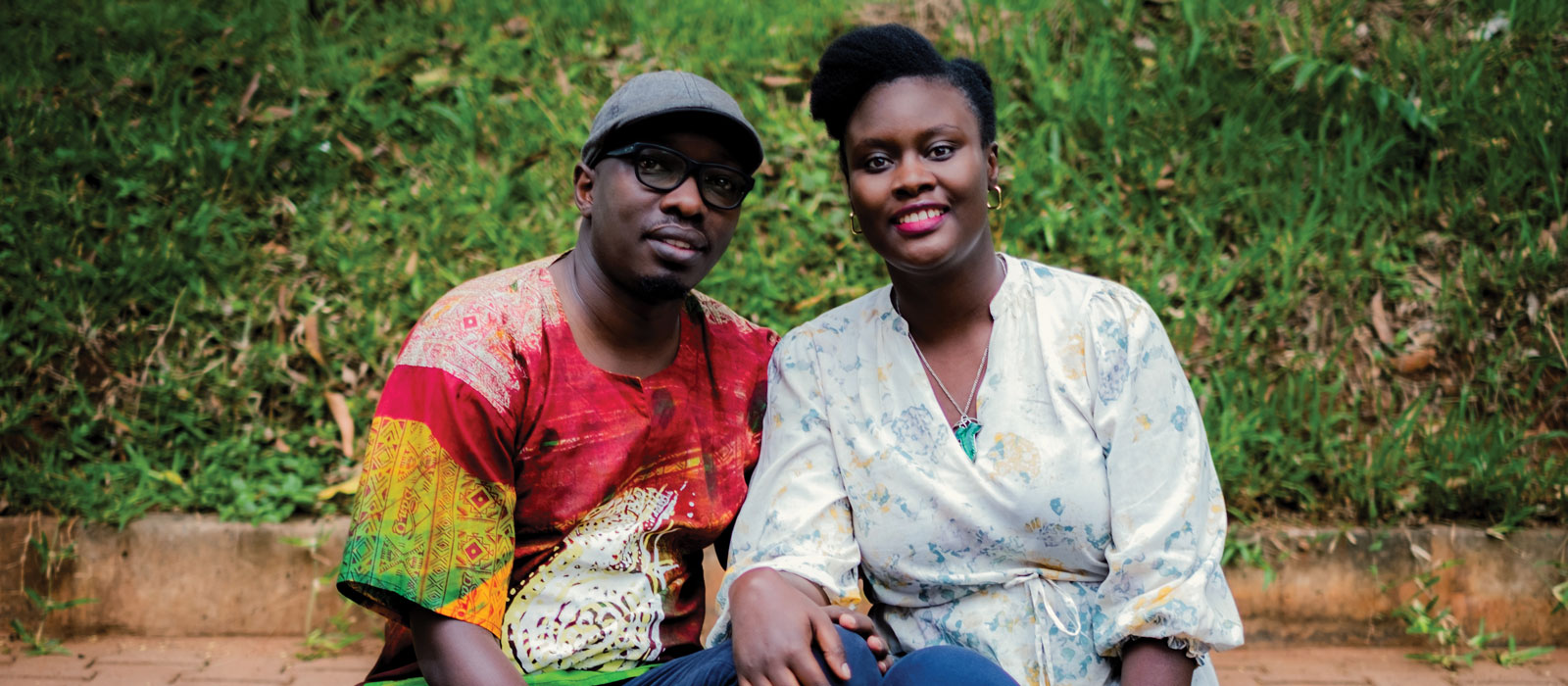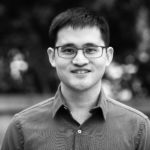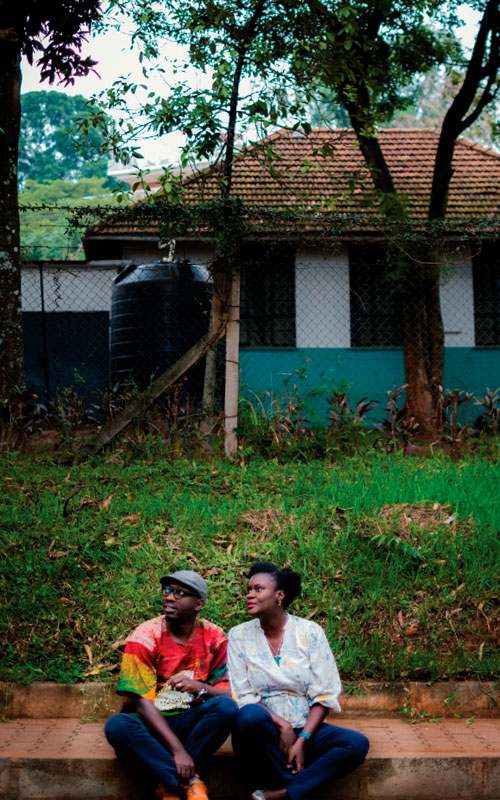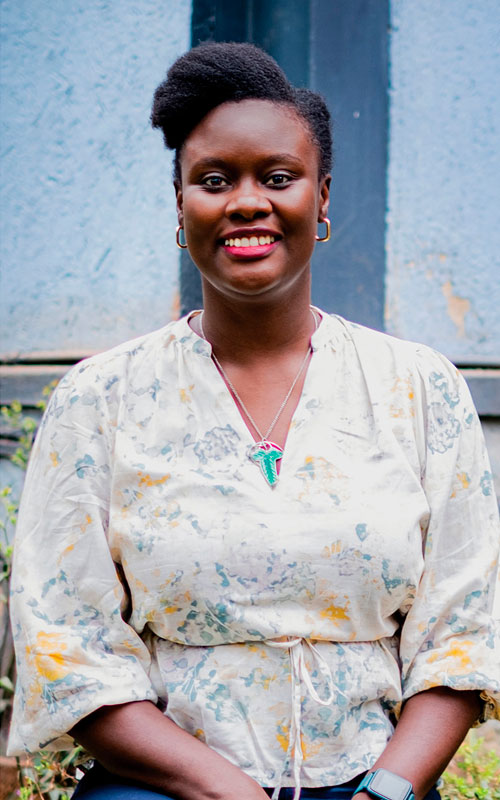
After six years in the United States, Grace (MAT ’20) and Yosam Manafa (MAICS ’18) returned to Uganda with seminary degrees, many lessons learned, and hope for the possibilities of ministry back home. “We had the rare opportunity to attend Fuller and get a world class education,” says Yosam. “The question is, how do we then give back what has been given to us to our local community?”
At Fuller, Grace and Yosam grew in their knowledge of the Bible, theology, missiology, and ministry in ways they hoped for and in other ways they hadn’t anticipated. “Fuller changes you,” says Grace. Their studies opened their eyes to see the wider ways faith and theology actually intersect with every area of life—including culture, politics, justice, race, economics, and the like. At the same time, becoming parents to their two children and living through the tumultuous and divisive post-2016 United States added another layer of perceptive-shifting formation during those years. Yosam says that while the level of transformation they experienced wasn’t what they expected, it has proved to be a good thing. “Fuller reshaped the things I am most passionate about and aligned them with my faith,” he says. “Seminary shifts you, and you begin to think about things differently.”
Coming back to Uganda afterwards hasn’t been without its challenges. After their years away, the Manafas admit to experiencing a little bit of reverse culture shock. Grace says their return home has required a period of adjustment, not only because of the transformation they experienced in the States but also because of the ways Uganda—which has gone through its own continued political uncertainty—had transformed in that time. Not to mention the fact that they returned in 2020, during the height of the pandemic. “Coming back to the place you’re from is not necessarily coming back to the place where you were,” explains Yosam. “Honestly, I don’t think we left the country this way when we left six years ago.”

JEROME BLANCO (MDiv ’16) is editor in chief of FULLER magazine and FULLER studio.
MUHAMMAD ALI KANCH is an award-winning documentary photographer based in Kampala, Uganda. See his work at mkanch.com
After six years in the United States, Grace (MAT ’20) and Yosam Manafa (MAICS ’18) returned to Uganda with seminary degrees, many lessons learned, and hope for the possibilities of ministry back home. “We had the rare opportunity to attend Fuller and get a world class education,” says Yosam. “The question is, how do we then give back what has been given to us to our local community?”
At Fuller, Grace and Yosam grew in their knowledge of the Bible, theology, missiology, and ministry in ways they hoped for and in other ways they hadn’t anticipated. “Fuller changes you,” says Grace. Their studies opened their eyes to see the wider ways faith and theology actually intersect with every area of life—including culture, politics, justice, race, economics, and the like. At the same time, becoming parents to their two children and living through the tumultuous and divisive post-2016 United States added another layer of perceptive-shifting formation during those years. Yosam says that while the level of transformation they experienced wasn’t what they expected, it has proved to be a good thing. “Fuller reshaped the things I am most passionate about and aligned them with my faith,” he says. “Seminary shifts you, and you begin to think about things differently.”
Coming back to Uganda afterwards hasn’t been without its challenges. After their years away, the Manafas admit to experiencing a little bit of reverse culture shock. Grace says their return home has required a period of adjustment, not only because of the transformation they experienced in the States but also because of the ways Uganda—which has gone through its own continued political uncertainty—had transformed in that time. Not to mention the fact that they returned in 2020, during the height of the pandemic. “Coming back to the place you’re from is not necessarily coming back to the place where you were,” explains Yosam. “Honestly, I don’t think we left the country this way when we left six years ago.”
JEROME BLANCO (MDiv ’16) is editor in chief of FULLER magazine and FULLER studio.
MUHAMMAD ALI KANCH is an award-winning documentary photographer based in Kampala, Uganda. See his work at mkanch.com


In part, this meant finding out that their theological formation had shifted their relationships to their faith communities back home, in ways that would require some recalibration. Grace puts it plainly, saying many see her as having attended “a liberal seminary.” Yosam adds, “I knew that the kind of theological reflection we were doing might be uncommon in the church. So how could we bring home what we’ve studied and translate it to serve our community?”
For Grace and Yosam, contextualization has been key.
A starting point for their ministry has been thinking through the ways faithful formation and practiced theology occur in a specific time and place—a specific context. This shapes their work in a twofold way: On one level, they must contextualize what they’ve learned in the States for ministry in Uganda. On another level, they have made it central to their ministry to help others contextualize their faith for their own everyday contexts. The Manafas are now helping others put feet to their theology and live out their Christianity in the midst of their lived experiences.
Grace shares some of the big questions that drove their approach to shaping their ministry: “Uganda is 84 percent Christian, but why is it that we still see so much corruption? So much injustice?” They asked, “What does it really mean to be a Christian in the marketplace? To be a Christian in the public space?” They reflected on the rates of poverty, the ongoing discrimination against religious minorities, and the continuous human rights violations. Now, Grace and Yosam are engaging with these issues in a few ways.
They founded Missio Uganda, an organization whose central focus is the intersection of faith and public life. Instead of working directly in church ministry, the Manafas are integrating their backgrounds in business administration and strategic management with their theological education to train and consult with churches, who in turn might shape their own congregations for faithful work in their respective contexts.
Missio Uganda focuses on three primary areas. “Faith in the Marketplace” aims to help Christians understand their vocation in light of God’s mission. “Faith and Politics” considers how Christians might embody faith in the political realm in a pluralistic world. “Faith and Social Justice Advocacy” reflects on peacemaking and the movement against oppressive systems in culture and society.
Outside of Missio Uganda, Yosam volunteers at a local seminary, teaching classes on missiology as well as introductory classes on Islam. He’s been invited by organizations, both Christian and Muslim, to speak and teach on the state of religion in Uganda, including topics like interfaith relations and religious-related human rights violations.
This work goes hand in hand with his current research, as Yosam is continuing his Fuller studies in the PhD in Intercultural Studies program, researching dual religious families. He’s been largely driven by his own dual religious experience, having grown up in such a home. “My dad was Muslim. My mom is a Pentecostal Christian,” he shares. “I was born in that context, of both of them practicing their faith. I would go to the mosque on Friday and the church on Sunday.”


In addition, Grace works with an organization called Interface: Institute of Religion, Faith, and Culture in Public Life. Interface “uses the power of conversation to bring people together, to know each other’s stories, and to understand and know people’s worldviews.” Grace says, “We focus on conversations that are usually difficult for young people to have because they are polarizing, too complex, or associated with some social stigma.” The organization hosts events called “Baraza by the Fire”—“baraza” being the Swahili word for “conversation”—which are formatted in line with a traditional African practice of using fireside spaces for conversation, learning, resolving conflict, and passing on traditions. By creating inviting and safe spaces, Interface facilitates dialogue on contemporary topics impacting Uganda and the world. Grace says, “We have people from all walks of life sit together, with a cup of tea, and talk about whatever specific issue is affecting the country at the time. We hear from all these really different voices, and we’ve found that it has this amazing power to connect people and to heal divides.”
Interface has hosted events on themes ranging from pandemic policy to the current political climate and interfaith issues. Grace says these conversations have helped people gain an awareness of their own stories, identities, and privileges, as well as the stories and realities of others—marginalized voices in particular.
The excitement and interest from these events have also overflowed beyond the formal conversations themselves, with participants expressing a desire to host dialogue spaces in their own communities. One woman excitedly shared about her hope to host a similar event tailored for children in particular. Another event for faith leaders on mental health left participants longing for more, so much so that Interface eventually published a free handbook to help equip pastors, imams, and other leaders on engaging with mental health issues in their work.
The couple’s different endeavors have been fruitful avenues for ministry. Yet the work is ongoing, and so are the challenges. The Manafas are continuing to learn in the process.
Grace shares a story where reverse culture shock played a part. Following a terrorist attack in Kampala, she had the idea for an Interface event discussing the political and social impact of the bombing. Her colleagues had to remind her about the many ways hosting such an event wouldn’t be safe. “Freedom of speech is taken for granted in the States!” she shares with a bit of a laugh—another lesson in context.
Additionally, theological tensions are a reality the Manafas continue to face, as Grace shares that many in their church networks hold different views of what ministry ought to be. Some are “not open to interreligious spaces or spaces formally outside of the church.” She says, “A lot of people have challenged me, saying, ‘What are you doing? If you aren’t telling people to repent or be baptized then what are you doing there at all?’ I didn’t expect to have to explain myself so many times.”
Still, the work goes on, and the Spirit continues to pave the way for these new ventures in ministry. Yosam says it’s been helpful to remind himself that, at the end of the day, “This is God’s church. It’s made of fallible people, but it’s God’s church.”
For them, this is the reality of ministry. “Full redemption has not yet happened,” Yosam says—their own formation included. But Grace and Yosam hope that they are playing a helpful part in the kingdom work. Whether in the States or in Uganda, in the marketplace or in politics, in the church or outside of it, they’ll keep on asking what our Christian faith could look like in our lived experience, a faith with feet on the ground.1
Amidst a trying season for All Angels’ Episcopal Church, Seth Little demonstrates how the creative arts can be a source of beauty and sustenance through disruption.